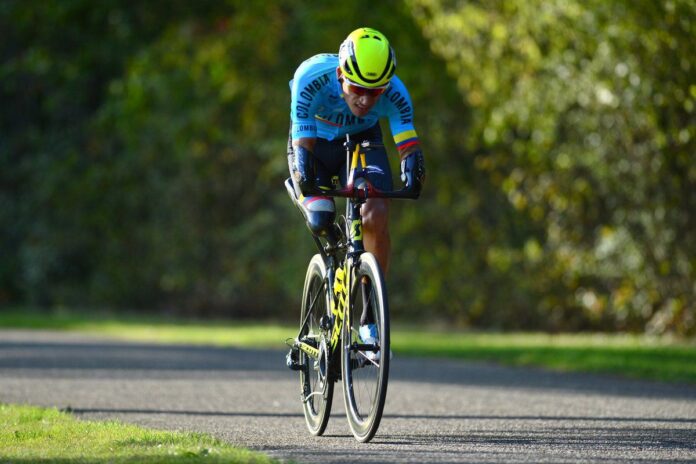Colombia’s Para is the first person to ever win two Paralympic golds at the same time in swimming.
 Following his escape from the Farc, Florian was nearly murdered by a bomb that was aimed at him.
Following his escape from the Farc, Florian was nearly murdered by a bomb that was aimed at him.
Juan Jose Florian grew up in a clearing he carved out of the Colombian jungle. Papayas, oranges, and avocados were his family’s main sources of income. During the night, however, the territory was controlled by illegal armed gangs.
Those who disobeyed the curfew were seized, shackled, and either left for the night or killed if they were repeat offenders. Every day, bodies were discovered on the woodland pathways.
There were no actual roads, and there was no television. Florian and his older brother Miller would sneak out at night to witness the tracer fire that lit up the night sky, cheering on the Colombian army in their war with the Farc (Revolutionary Armed Forces of Colombia) and other rebel organizations, while other youngsters followed football clubs.
“We could play outdoors till late while the army was around, and the kids were secure from forced conscription,” Florian adds.
Guerrillas from the Farc – which was created in 1966 and dissolved in 2016 after signing a truce – were frequent visitors to the family home, demanding food, money, and other items.
When Florian and his brother Miller grew up, they both vowed to join soldiers. Miller was 23 when he traveled to the next town, submitted his paperwork at a checkpoint, and was informed that he had missed his mandatory military duty deadline. He didn’t say anything about it.
A group of Farc troops paid Florian’s family a visit in their remote woodland clearing a few weeks later with a message. They said that since the family had given one son to the reactionary forces, they owed another to the revolution.
“My mother attempted to combat them. She begged them to listen to her. She blessed me through her tears as they dragged me away “Florian explains.
In this manner, Florian, who was 16 at the time, was drawn into a war that claimed the lives of 260,000 people and displaced over six million people between 1954 and 2016, on the opposite side of his own brother. During the Farc’s five decades of armed conflict as the country’s main rebel organization, he was one of nearly 18,000 minors, 70% of whom were under the age of 15.
“We were put under hours of psychological duress,” Florian explains. “They instilled ideals that were diametrically opposed to those of my mother. I was always planning my escape. My days were devoted looking, listening, and planning. I saw deserters being executed for betraying the cause.”
Florian, on the other hand, rejected their brainwashing and, after a year as a young guerilla, he spotted his opportunity to go.
 A picture of Florian as a soldier is displayed by Florian and his wife Angie.
A picture of Florian as a soldier is displayed by Florian and his wife Angie.
The 27th Front, his unit, was ordered to assault a police post. Helicopters were sent by the army.
“They saw us and opened fire,” he adds. “I took cover behind a tree’s canopy. I moved around the trunk while a chopper buzzed above me.”
Florian dashed into a farmhouse while his buddies escaped, catching the residents – a man and his wife – off guard.
“There were a lot of Farc sympathizers in those places, and they got a reward if they turned in deserters, so I told them, ‘If you make one incorrect move, I’ll shoot.’
“I said that I was in need of clothing.” I was given a pair of pants and a white shirt by the guy. I forced him and his wife to lie down on the floor, and I changed out of my fatigues with my one free hand. I raced out of the home after telling them not to get up.
“I came upon an army roadblock and threw my firearm away before approaching. I explained to the officer that I was a guerilla and that I wanted to surrender. I admitted to him that I hadn’t eaten in two days. They fed me and I informed them about my ordeal. They inquired as to which unit my brother served in. Thankfully, my brother had informed the authorities about my forced enlistment, and they verified that I was who I claimed to be.”
Florian was put under military protection in Bogota, Colombia’s capital.
He explains, “I was terrified to walk out on the street in case they discovered me.” “It was a terrible experience. I was so young, and I was up against such a formidable foe.”
His mother was forced to abandon the property with her other children, whom she sent to boarding school for safety reasons.
Florian enlisted in the Colombian army after he turned 18 in 2000. Following his training, he spent the next 12 years combating drug cartels and gasoline smugglers. Miller, his brother, continued his military career, but was killed in a gunfight with the Farc in El Dorado, Meta, some 350 kilometers south of Bogota.
“He shot and murdered a guy in a very convoluted operation,” Florian adds. “It was discovered that he had shot his closest buddy when they went to identify the corpse. It slammed into him like a ton of bricks. He was taken aback.”
Miller started exhibiting symptoms of persistent paranoid schizophrenia. Florian went home on vacation to visit him. Their mother had sold the farm and refused to pay the Farc’s so-called levy. They had located her at her new residence. A parcel appeared in the yard on July 12, 2012.
“I recall seeing something at the entrance,” Florian adds. I approached it, crouched, and extended my hands. The next thing I remember is screaming on the ground. My arms were both gone.
“Above the knee, my right leg had been severed.” I was covered in second- and third-degree burns. My right eye was gone, and my right ear was deafeningly deafeningly deafeningly deafeningly deafening ‘Kill me,’ I screamed at my brother, who was clutching my head. Please shoot me. ‘I’m not going to be able to live like this.’
“‘Don’t ask that of me,’ he said as he caressed my hair. ‘Don’t worry, you’ll be OK.’ I was hurling obscenities at him in an attempt to enrage him. After that, I passed out.”
After 12 days in a coma, Florian awoke. Following that, months more procedures and skin grafts were required. Depression, hallucinations, and suicidal ideas engulfed his emotions.
He admits that he pondered hurling himself out the window or down the stairway. “‘But what if I fail and wind up much worse?’ I wondered. To be able to leap in front of an automobile, I chose to learn to walk. But, at the end of the day, I came to the same conclusion: what if I live?”
 In 2023, Florian won the Colombian paracycling road race and time trial championships.
In 2023, Florian won the Colombian paracycling road race and time trial championships.
He had the good fortune to be moved to the Private Jose Maria Hernandez Battalion, an unique corps in the Colombian Army for soldiers traumatized by the war, after months in intensive care and innumerable demonstrations of sorrow.
“I was tired of being pitied,” Florian adds, “but I found myself in a place of laughing and fraternity.” “The other troops referred to me as ‘Quarter Chicken.’ They rubbed their hands over my stumps and laughed at me. We exchanged threats of fist fights, but no one had any fists! I came back to life in their presence.”
Florian started hydrotherapy as part of his treatment. It didn’t take long for the group sessions to become competitive.
He discovered that he could hold his breath under water for longer than his peers, and he was able to outrun them across a length of the pool. He began timing himself in order to better his times. He encountered individuals wounded in traffic accidents or suffering from degenerative conditions while participating in the Para-Swimming League in Bogota. Florian joined the military squad’s swim team.
“To cope with the anguish, some of my acquaintances have spent their lives drinking. I want a different existence “he declares
“I started swimming longer lengths. With the few limbs I still had, my ambition grew. There were no impediments, no barriers, and no prejudice in para-swimming. I had just completed psychiatric treatment and was reliant on medication for sleep and mental clarity. Swimming allowed me to stop taking my medicine. Swimming, in a sense, became my medicine.”
In 2013, Florian earned his first medal in a competition organized by the University of Minnesota. He participated in the S5 butterfly class for three years, smashing records all across Colombia, Venezuela, Brazil, the United States, and Canada.
In 2015, he earned his last medal at the national games. He was pensioned out of the service the next year, four years after the explosion, and began a university degree in psychology. He opted to pursue another sports goal since he was no longer allowed to participate in the military para-swimming squad.
“Like most Colombians, my stepfather, who raised me, was crazy with riding,” he recalls. “He always held a transistor radio to his ear throughout the Tour de France, the Giro d’Italia, and the Vuelta a Espana, listening to the race.”
Even as a youngster, Juan had never ridden a bike.
“And I believed I’d never be able to do it. I figured you required arms and legs, as well as strong eyesight and reflexes “he continues.
However, his curiosity got the best of him.
“Someone had given my sister a bicycle with which to go to work. I took it down a side street with a buddy, roped my arms’ stumps to the handlebars, and started off.
“I was afraid I’d lose my equilibrium and go over sideways. In reality, I had tens of thousands of negative ideas. However, as soon as I got on the bike and pulled the pedal with my good leg, I realized I was mistaken. ‘Let go!’ I said to my pal. ‘I can be a biker!’ I exclaimed as I cycled up the street, turned around, and returned. ‘I have everything it takes to be a Paralympic cyclist!’”
Angie, Florian’s wife, got to work on improving the bike. She utilized power tools to transform metal sheets into buckets for his arm stumps, but he had back discomfort and tendinitis as a result. He requested support from the national sports authority. It was all in vain.
“Professional athletes with minor impairments are more welcome in Colombia’s Paralympic system than triple amputees. We are seen as a possibly costly issue or as rehab patients “Florian is convinced.
In December 2017, he discovered the answer on his own.
 Florian is in training with his wife Angie.
Florian is in training with his wife Angie.
“I was asked to make a motivating speech at a Colombian Air Force installation in the coffee-growing area, where the Air Maintenance Corps is stationed. They asked me to tell them a little about myself and what I did on a daily basis.
“After speaking with the engineers, I realized they were aerodynamics specialists who worked with carbon fiber. ‘We’ve never dealt with bikes, but let’s do it!’ they responded when I asked if they could assist me alter my bike.
“They took some of their own ideas, as well as some of mine, and we started working on weight, aerodynamics, and everything.”
Florian believes he has the most amputations of any C1 rider in the planet. His injuries pose significant challenges for bike designers. Despite this, the aircraft engineers took an 18kg bike and modified it using cutting-edge carbon fiber to lower the weight to 8.5kg.
He sponsored travels to World Cup tournaments in Belgium, Italy, and the Netherlands, as well as World Championships in the Netherlands and Portugal, by arranging raffles and adding voluntary donations and minor sponsors to his army pension.
Movistar Colombia, a telecommunications company, started sponsoring him in 2019. He was so well-known that he earned the moniker “Superhero.”
“Mochos are a term used in Colombia to describe persons who have had their limbs amputated. When I first began riding, I thought to myself, “If Superman and Batman can be heroes, why couldn’t I be Mochoman?””
With just three spots available for paracycling and a large list of eight competitors, Florian’s ambition to compete in the Tokyo Paralympics was unsuccessful. He, on the other hand, accepted it philosophically. “I’m still alive, and the Olympics are coming up,” he adds.
He was won Colombia’s national para-cycling champion in the road race and time trial in November of this year, at the age of 39.
He’s also got a new target. Florian, who is an outstanding swimmer and biker, wants to compete in an Ironman triathlon. “A gift of life and my second birth,” he says of the blast that almost killed him.
“I’m in the middle of running, jogging, and I’m extremely thrilled,” he adds. I don’t have a specific prosthesis or a medical team to help me, but we’ll start working on it with the folks I have.
“I want to show the rest of the world that you can achieve your goals.” It isn’t just about rehabilitation; it is much more. We are squandering a treasure of human potential in the troops and police officers we lose to armed combat, which is frequently lost to alcohol and narcotics.
“I want to be the voice urging that the government provide greater possibilities for its injured warriors.”



